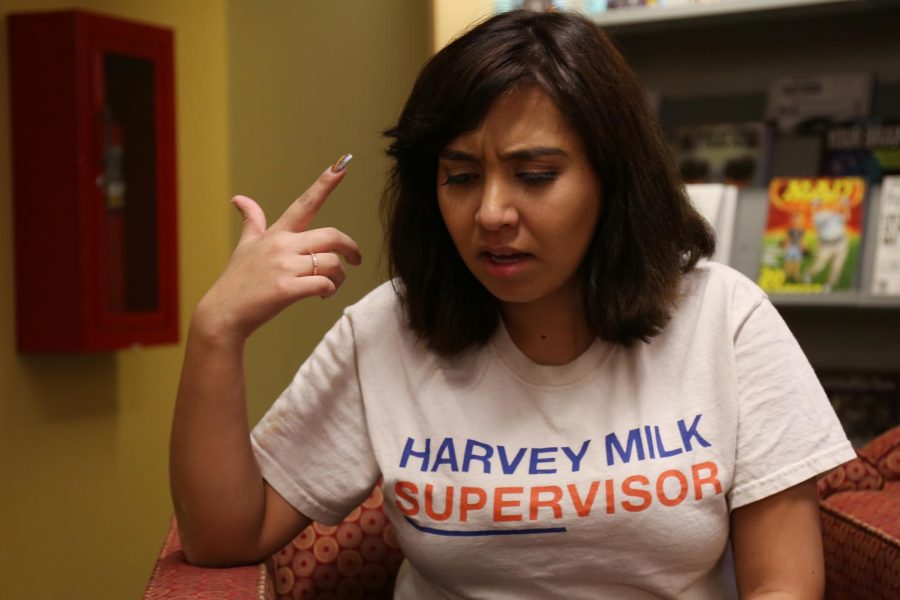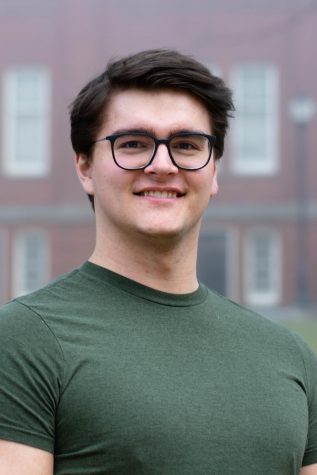Administration must follow through on promises
Making realistic commitments should be top priority during negotiations, discussions of sit-in demands
Abby Linnenkohl | The Daily Evergreen
Alejandra Martinez, chair for WSU Queer People of Color and Allies and co-chair of MEChA, explains her hope this year for the WSU administration to work with those who are marginalized and to make WSU a more inclusive place Monday afternoon in the CUB.
January 10, 2018
Following the August sit-in at the Lighty Student Services building, protesters demanded more support and resources for multicultural and minority students. Despite responding to the list of demands with the intention of working with students, WSU administrators have yet to truly make good on their promises of change.
“The administration gave us a timeline [saying], ‘This is when we’re going to have this all done,’ meetings and everything,” Alejandra Martinez, sit-in participant and chair of the Queer People of Color Alliance said.
Unfortunately, that timeline hasn’t been honored by faculty. There is nothing new about administration having difficulty keeping promises. What makes this failure particularly troubling, however, is that despite administration giving themselves a timeline, they still weren’t able to hold themselves to their word.
“They did say that they would have a whole testing session of cultural competency training for incoming first-year students during this term,” Martinez said. “They said that we would have meetings in October, but it never happened.”
Other students and organizations who were promised roles in working toward specific objectives also felt the university’s response should have been more effective.
“As blunt as I can make it, it’s a joke,” said Rumnik Cheema, president of the Asian Pacific American Student Coalition. “At this point it’s been what? Five or six months, now? It doesn’t really matter anymore whether we’re blunt or vague about it, the issue is [they’re] not doing anything to help us.”
While both Martinez and Cheema acknowledge that some progress has been made in negotiations, they are frustrated with the way officials consistently fall short of their commitment to enact sweeping change. This failure is made worse by the fact that it’s centered on sensitive issues like gender, race and the current polarization of politics in the U.S.
“This university is just catching up,” Martinez said. “All these historically white universities and institutions are catching up to the fact that they have people of color in their institutions and that we come from different experiences.”
The responsibilities of managing a university are immense, and certainly can’t be easy, but an easier strategy than breaking promises is to make ones that are possible to keep. Even though hope drives people to strive for better circumstances, that desire needs success in order to stay strong.
Martinez says she is hopeful that QPOCA and other student groups can continue to work closely with university officials. If change is to happen to create a better situation for marginalized students, Martinez said it has to happen now in order to be meaningful.
When people have expectations, especially relating to sensitive issues like race representation, having hope taken away diminishes their resolve and makes them feel like they don’t matter.
In order to gain back their credibility in the eyes of students, WSU leadership has several important tasks ahead of them. They must acknowledge instances in the past where they were unable to keep their word, and make commitments that are realistic in regards to resources and staff. They need to tell us the truth, not just what we want to hear.
Change never happens because of one person, and it certainly doesn’t happen all at once. That is why it is OK to be realistic instead of idealistic when talking about people’s livelihood.
It was Robert Kirkman who said, “The pessimist looks down and hits his head. The optimist looks up and loses his footing. The realist looks forward and adjusts his path accordingly.”
We need more realists at WSU.






















